|
|
|
Sort Order |
|
|
|
Items / Page
|
|
|
|
|
|
|
| Srl | Item |
| 1 |
ID:
174152
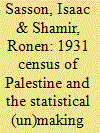

|
|
|
|
|
| Summary/Abstract |
This study sits at the intersection of census-making, colonialism, and the politics of statistical expertise. It considers the Palestine Census that the country’s British rulers had undertaken in 1931. It focuses on British intentions to include questions that could have yielded data about the alleged emergence of an Arab ‘landless class’. The validation of such a category would have justified British restrictions on Jewish immigration to Palestine. We trace the trajectory of ‘landlessness’ as a statistical category. We show that disparity in statistical expertise between Arab and Jewish experts, and a parity between Jewish and British experts, played a decisive role in shaping the census schedule. Consequently, Arab landlessness failed to become a valid statistical category. Our case highlights British census-making in India as a broad colonial model to be applied in other colonies and to be used as a scientific justification for Britain’s various political agendas.
|
|
|
|
|
|
|
|
|
|
|
|
|
|
|
|
| 2 |
ID:
082689


|
|
|
|
|
| Publication |
2008.
|
| Summary/Abstract |
By 1925, 30 years after Kenya became a British colony, there were no high schools for Africans in the colony. In 1926, the Africans decided to build their own high schools through their Local Native Councils (LNCs) but the Government refused to sanction the building of the schools and this led to a protracted struggle. The Kiambu LNC's abortive high school at Githunguri is used as a case study to examine not only why the Government vetoed the building of the schools, but also to show how this greatly undermined the expansion of African higher education in subsequent years.
|
|
|
|
|
|
|
|
|
|
|
|
|
|
|
|
| 3 |
ID:
133202
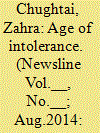

|
|
|
|
|
| Publication |
2014.
|
| Summary/Abstract |
To ensure our success as nation, we need to turn our attention to the country soul since the vast subcontinent was divided, and than some 20 odd years later sub-divided once again, Pakistanis have plenty to ponder.
|
|
|
|
|
|
|
|
|
|
|
|
|
|
|
|
| 4 |
ID:
101823


|
|
|
|
|
| Publication |
2011.
|
| Summary/Abstract |
This study investigates the history and development of the Anglican Church under the Turkish, British, Jordanian and Israeli regimes. The paper recounts the development of various societies within the Anglican church and their politization, especially in the context of decolonization and the Arab-Israeli conflict over time. Our analysis is strengthened by an examination of the struggle over Church property between the local Arab clergy, the British Church leaders and the Israeli government. We conclude with a discussion of the scope and nature of the political and spatial/legal development of the Anglican Church in Palestine/Israel in the modern era. We stress the unique influence of spatial, political, economic, and political implications, at the local and international levels and situate the history within the general context of the Middle East, colonialism, Church history and local empowerment.
|
|
|
|
|
|
|
|
|
|
|
|
|
|
|
|
| 5 |
ID:
166882
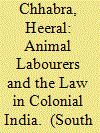

|
|
|
|
|
| Summary/Abstract |
This article is a tentative effort to highlight the symbiotic but systematically underrated position of animals in labour history. It argues for an expansion of human-centric definitions of labour to include non-human animals in this domain. The discussion focuses in later parts on colonial rule in India to examine debates about three colonial legislative enactments dealing with animals as labouring bodies in various capacities. Predictably, this colonial discourse and intervention remains human-centric, too. Yet, closer reading of such historical evidence also indicates exciting scope for developing various aspects of the ‘animal question’ in relation to labour history and South Asian studies.
|
|
|
|
|
|
|
|
|
|
|
|
|
|
|
|
| 6 |
ID:
078779
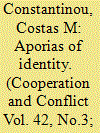

|
|
|
|
|
| Publication |
2007.
|
| Summary/Abstract |
This article examines the predicaments and paradoxes of identity politics in Cyprus. It looks at the historical alliance of colonial practices and nationalist rationales that brought about a static bicommunal system, establishing the basis for inter-ethnic conflict, or what became known as the `Cyprus problem'. The advent of modern governmentality, dividing and classifying the Cypriot population, helped, in addition, to solidify fluid and ambiguous ethno-religious boundaries, making it more difficult for individuals to use ethno-religious identities flexibly and pragmatically, including their use as a tactic to resist the policies of consecutive regimes of power. The article suggests that the 'Cyprus problem' provides a moral alibi for the pursuit of a range of problematic regulations and practices against individuals caught between the dominant ethnic identities, even though there also exist windows of opportunity and resistance on the ground. The article focuses on the genealogy and presence of hybrid communities and syncretistic lifestyles, which complicate and transgress the binary of Greek/Christian versus Turk/Muslim, and the existence of which became progressively abnormalized or exoticized
|
|
|
|
|
|
|
|
|
|
|
|
|
|
|
|
| 7 |
ID:
092423
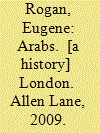

|
|
|
|
|
| Publication |
London, Allen Lane, 2009.
|
| Description |
vii, 533p.Hbk
|
| Standard Number |
9780713999037
|
|
|
|
|
|
|
|
|
|
|
|
Copies: C:1/I:0,R:0,Q:0
Circulation
| Accession# | Call# | Current Location | Status | Policy | Location |
| 054619 | 909.04927/ROG 054619 | Main | On Shelf | General | |
|
|
|
|
| 8 |
ID:
116884
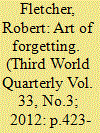

|
|
|
|
|
| Publication |
2012.
|
| Summary/Abstract |
This article explores the implications of a phenomenon that, following Renato Rosaldo's influential discussion of 'imperialist nostalgia', I call 'imperialist amnesia': the fetishistic disavowal of the legacy of European colonisation within contemporary postcolonial societies. I describe the manifestation of this amnesia in discourses as diverse as academic scholarship, international development and travel writing. Observing the recurrence of imperialist amnesia in the face of persistent attempts to historicise postcoloniality, I propose that the disavowal of colonialism functions as what Michael Taussig calls a 'public secret'-something commonly known but not generally acknowledged-helping to efface the grim realities of the colonial enterprise. Public secrecy by its nature defies most attempts at disclosure; hence efforts to publicise colonialism's contemporary influences may paradoxically reinforce their obfuscation by perpetuating the very imperialist amnesia they seek to dispel.
|
|
|
|
|
|
|
|
|
|
|
|
|
|
|
|
| 9 |
ID:
157120
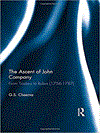

|
|
|
|
|
| Publication |
New Delhi, Manohar Publishers and Distributors, 2017.
|
| Description |
368p.hbk
|
| Standard Number |
9789350981528
|
|
|
|
|
|
|
|
|
|
|
|
Copies: C:1/I:0,R:0,Q:0
Circulation
| Accession# | Call# | Current Location | Status | Policy | Location |
| 059282 | 954.03/CHE 059282 | Main | On Shelf | General | |
|
|
|
|
| 10 |
ID:
114010
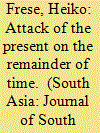

|
|
|
|
|
| Publication |
2012.
|
| Summary/Abstract |
Using the example of a local chronicle from early nineteenth-century Orissa, this article discusses the structure, content and strategy of selected historiographical texts of the period. Contemporary events and the immediate past can be identified in the texts and indeed govern their plots, reflecting a new representation of reality in historiography of this kind. Thus, the changing hegemonic order of such texts-where content begins to override form-mirrored the changing political world. Colonial discourse started to soak into Indian historiography.
|
|
|
|
|
|
|
|
|
|
|
|
|
|
|
|
| 11 |
ID:
116843
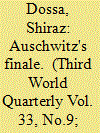

|
|
|
|
|
| Publication |
2012.
|
| Summary/Abstract |
It is passing strange that the existence of Auschwitz has not lessened racism. In fact quite the reverse: it has unleashed surplus racism on the 'Third world' and its 'natives'. As I contend here, this is the Auschwitz finale, its abject truth, the dialectical residue of the Holocaust. Jacob Neusner calls it the Holocaust 'myth' and 'mythic theology'. It now constitutes the ruling narrative in the West. This article dissects the Auschwitz discourse and its denial of other holocausts. It critiques the claim that it was the only 'real' genocide. It advances a contrary thesis on colonialism, racism and holocausts in history. I clarify the affinity between colonialism and fascism and Israeli tactics in Occupied Palestine. It is undeniable that Auschwitz fuels anti-Arab anti-Semitism and anti-Islamism. In my conclusion I analyse Jewish criticism of the Auschwitz finale.
|
|
|
|
|
|
|
|
|
|
|
|
|
|
|
|
| 12 |
ID:
153536
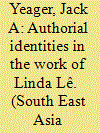

|
|
|
|
|
| Summary/Abstract |
Issues of authenticity, originality, and plagiarism have haunted Francophone literatures from the time Camara Laye was first accused of having copied the work of others. Official positions on plagiarism and copyright have provided a framework to judge the originality of literary and scholarly work, but even these pronouncements leave much open to interpretation, which may, in fact, mask the real motivations for accusations of plagiarism. Francophone writers with links to Vietnam would also be under scrutiny in such a context. Linda Lê, the most prolific writer “from Vietnam” who writes in French, cleverly and playfully treats the questions of literary authenticity, creativity, originality, intertextuality, and authorship in a strong metatextual thread running in some form throughout her long bibliography. In this way, she also examines the position of the immigrant writer in exile, the negotiation of multiple heritages and languages, and what is necessarily the shifting literary scene in France and elsewhere, as immigrant writers, among others, redefine “French literature.”
|
|
|
|
|
|
|
|
|
|
|
|
|
|
|
|
| 13 |
ID:
074508
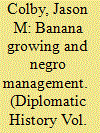

|
|
|
| 14 |
ID:
107960
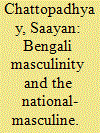

|
|
|
|
|
| Publication |
2011.
|
| Summary/Abstract |
This article examines how Bengali masculinity has been negotiated between national and ethnic/local notions of identity and suggests a new way of understanding this issue. Within the specific historiography of Bengali masculinity, concerns regarding physical strength, courage and virility of the Bengali male have been central tropes, challenged by the colonially constructed stereotype of the effeminate Bengali. The present article maps mainly nineteenth century discourses regarding Bengali masculinity and focuses on one particular strategy of three, namely, construction of a mode of mythic-historical discourse to reclaim a supposedly more masculine past for Bengali men. This suggests the notion of national-masculine as a gendered materialisation of the compensatory agency of Bengali masculinity. Shown to occur through the articulation of buddhibal in contrast with bahubal that negotiates with the hegemonic national-masculine, this throws new light on the emerging prominence of the bhadralok concept of a sophisticated Bengali gentleman.
|
|
|
|
|
|
|
|
|
|
|
|
|
|
|
|
| 15 |
ID:
132961
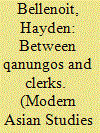

|
|
|
|
|
| Publication |
2014.
|
| Summary/Abstract |
This paper argues that our understanding of the transition to colonialism in South Asia can be enriched by examining the formation of revenue collection systems in north India between 1750 and 1850. It examines agrarian revenue systems not through the prism of legalism or landholding patterns, but by looking at the paper and record-based mechanisms by which wealth was actually extracted from India's hinterlands. It also examines the Kayastha pensmen who became an exponentially significant component of an Indo-Muslim revenue administration. They assisted the extension of Mughal revenue collection capabilities as qanungos (registrars) and patwaris (accountants). The intensity of revenue assessment, extraction and collection had increased by the mid 1700s, through the extension of cultivation and assessment by regional Indian kingdoms. The East India Company, in its agrarian revenue settlements in north India, utilized this extant revenue culture to push through savage revenue demands. These Kayastha pensmen thus furnished the 'young' Company with the crucial skills, physical records, and legitimacy to garner the agrarian wealth which would fund Britain's Indian empire. These more regular patterns of paper-oriented administration engendered a process of 'bureaucratization' and the emergence of the modern colonial state.
|
|
|
|
|
|
|
|
|
|
|
|
|
|
|
|
| 16 |
ID:
155140
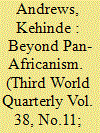

|
|
|
|
|
| Summary/Abstract |
Pan-Africanism is an identifiable movement with its own history and historical and ideological roots. It formally began at the first Pan-African Congress in London in 1900 and has a distinct linage up to the present day African Union. Unfortunately, the movement has not presented a challenge to imperial domination in Africa, rather it has helped continue the exploitation of the continent. Accepting the colonial nation state has prevented any politics of liberation from developing in the movement. It is central to decentre Pan-Africanism from radical histories of resistance because the movement developed in parallel to and rejection of more revolutionary, anti-imperial politics. Garveyism developed a mass movement rooted on the global Black nation, shattering the boundaries of Westphalian sovereignty. Malcolm X picked up the work of Garvey, developing on some of its regressive weakness to form the Organization of Afro-American Unity. By unpicking this tradition from Pan-Africanism we can begin to chart a route to revolutionary concepts and practice of nationalism that can present a challenge to the imperial social order.
|
|
|
|
|
|
|
|
|
|
|
|
|
|
|
|
| 17 |
ID:
155520
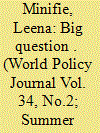

|
|
|
|
|
| Summary/Abstract |
World Policy Journal asked experts from Canada, Kenya, Australia, and Chile how colonialism impedes justice for indigenous peoples.
|
|
|
|
|
|
|
|
|
|
|
|
|
|
|
|
| 18 |
ID:
069829
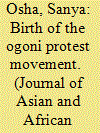

|
|
|
| 19 |
ID:
075667
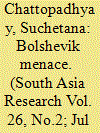

|
|
|
|
|
| Publication |
2006.
|
| Summary/Abstract |
This article examines the impact of the anti-Bolshevik surveillance network created by the colonial state on the urban political milieu of Calcutta during the late 1910s and the early 1920s. The first socialists in Calcutta (1921-24), predominantly Muslims, emerged from the ranks of urban intellectuals and political activists. The article argues that the state's insistence on labelling various social and political segments, including early socialists, as political tools of Moscow demonstrated its inability to grasp the local responses to an international current. It is shown that despite enforcement of various strategies, which tried to anticipate and prevent the spread of socialism, the colonial state failed to counter the emergence of the left in the city.
|
|
|
|
|
|
|
|
|
|
|
|
|
|
|
|
| 20 |
ID:
190675
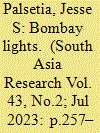

|
|
|
|
|
| Summary/Abstract |
Gas lighting, part of a re-envisioning of cities as modern metropoles, was one of the first ‘modern’ technologies implemented in nineteenth century Bombay. The debates over the implementation of gas light to illuminate the streets of Bombay have largely been overlooked in the history and historiography of colonial Bombay. Yet, the illumination of Bombay’s public streets with gas light was an important turning point in the transition of Bombay from a provincial outpost to a modern city. The article examines the related debates, presents the illumination of colonial Bombay with gas light as a metaphor for the emergence of the modern city and depicts how new processes regarding civic planning and development emerged from this gas light debate, which ultimately made the implementation of electrical light and other aspects of modern city life possible.
|
|
|
|
|
|
|
|
|
|
|
|
|
|
|
|
|
|
|
|
|